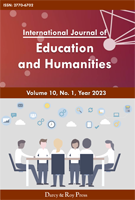Construction of Ideological and Political Cases for the Course "Compiling Technology"
DOI:
https://doi.org/10.54097/ijeh.v8i3.8667Keywords:
Compiling Technology, Ideological and Political Education, Teaching Reform.Abstract
This article aims at the current situation of college students' value shaping and emotional psychology that have not yet taken shape. By constructing ideological and political case construction ideas, ideological and political elements such as philosophy, ethics and regulations, and a sense of social responsibility are integrated into the teaching process of compilation technology. In the teaching process, dogmatic preaching should be avoided, and the basic teaching method of ideological and political education should be from perceptual to rational, from concrete to abstract, and from special to general. Ideological and political education should be integrated into the teaching of professional skills and knowledge. Taking a class teaching design as an example, this article introduces how to organically combine ideological and political education with professional knowledge.
Downloads
References
https://ishare.ifeng.com/c/s/7zkvmgqeoOJ
ZhiYong Chen, HuaChang Ye and XiaoQin Zhang (2021). Curriculum Ideology and Politics for Computer Majors: Core Elements, Basic Principles, and implementation strategy. China University Teaching, vol.4, no.368, p.34-38+65.
QL. Chen, Xu.WU,Yu.Sun and Juan.Shi (2022). Exploration of Computer System Ability Cultivation Approaches for Integrating Chinese University Teaching into Curriculum Ideological and Political Education. Computer Education, vol.4, no.328, p.28-32.
Zhuo Zhang (2021). The Application of Interactive Case method Method in "Compilers: Principles, Techniques, and Tools". Industrial and Information Technology Education, vol.2, no.98, p.61-65.


















